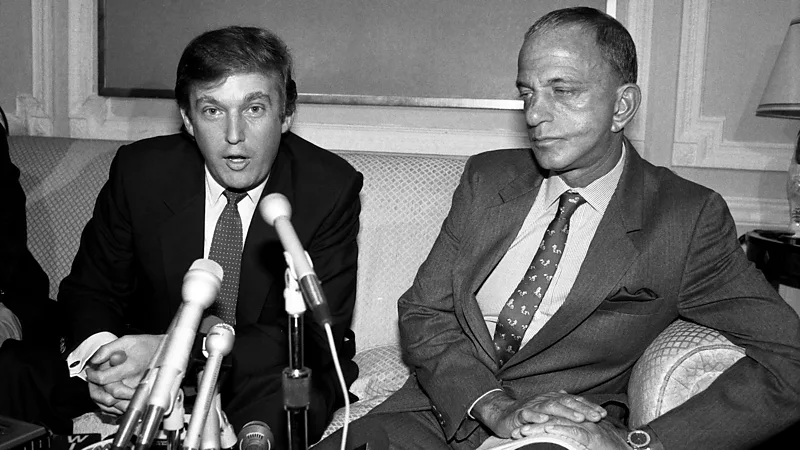Roy Cohn: The mysterious US lawyer who helped Donald Trump rise to power
As new film The Apprentice premieres at the Cannes Film Festival, a look at the cultural afterlife of political hitman Roy Cohn, who was Donald Trump's mentor in his early career – teaching him to "attack, counterattack and never apologise".

The Apprentice, one of the highest-profile films in competition at Cannes, borrows the title of Donald Trump's reality show and turns it upside down. Here the apprentice is Trump himself (Sebastian Stan) as a young businessman being tutored in the ways of power and influence by the unscrupulous lawyer Roy Cohn. Jeremy Strong – the ambitious, cold-blooded Kendall Roy in Succession – plays the mentor, but Kendall would look like a well-behaved pussycat next to the real Roy Cohn.
Cohn is best known now for the lessons he taught Trump, but even before that he was an outsized figure running through US politics and culture. To note his most flagrant hypocrisy, Cohn was a gay man who persecuted other gay people out of their government jobs during what became known as the Lavender Scare of the 1950s. Throughout his life, he bullied people and tried to bully facts. He died of Aids in 1986, insisting publicly that he had liver cancer and denying to the end that he was gay, despite taking his lovers along to public events.
Culturally, he is a furious, menacing character in Tony Kushner's Angels in America and in the recent miniseries Fellow Travelers. He was even the inspiration for Mr Burns' nasty unnamed lawyer on The Simpsons. Esquire magazine reflected the dominant public opinion by noting that Cohn "galloped through the second half of the 20th Century like a malevolent Forrest Gump".
Cohn has had a vampiric afterlife, with an impact on the US for 70 years – Thomas Mallon
Thomas Mallon, who wrote the 2006 novel Fellow Travelers, the basis for the show, tells the BBC, "One surprise – not evident when I was starting the novel 20 years ago – is that Cohn would have a vampiric afterlife even well beyond something like Angels in America. And of course he owes that to Trump." Cohn does keep coming back from the dead. As Mallon says, "Insofar as he personally affected Trump's thinking and behaviour, one realises that Cohn has had an impact on the republic, albeit at intervals, for 70 years," an astute observation that makes The Apprentice all the more relevant.
Cohn was, in some ways, brilliant. He was barely into his 20s when, as an assistant prosecutor in 1951, he helped engineer the conviction and execution of Julius and Ethel Rosenberg as Soviet spies, and acknowledged using illicit, back-channel conversations with the judge to get the death penalty. Soon after, he became notorious as chief counsel for Senator Joseph McCarthy's committee rooting out Communists and supposed Communists from the government.
In New York during the 1970s and 80s, he partied at the drug-fuelled nightclub Studio 54, and wielded influence as a friend of the famous and powerful, including Barbara Walters, Andy Warhol and Ronald and Nancy Reagan. As a lawyer, he represented clients from Mafia bosses to Trump, and weeks before he died was disbarred for, among several offences, defrauding other clients. He was also well known for his habit of eating off other people's plates, uninvited, even in the poshest restaurants. (Narcissism or just gross table manners? Probably both.)
His alliance with Trump began in the early 1970s when the US government sued Trump and his father for discriminating against black renters in apartments they managed. Cohn had Trump countersue the Justice Department. The case was settled, and started a litigious pattern that helped define Trump's career in business and later politics. A Washington Post article about Cohn's influence, published during the 2016 presidential campaign, had the headline "The man who showed Donald Trump how to exploit power and instill fear", and summed up his lesson as "a simple formula: attack, counterattack and never apologise". Cohn was also expert at media manipulation.
The historical Cohn is on display in the 2019 documentary Where's my Roy Cohn? Although not focused on Trump, the film takes its title from one of his now-famous comments. When Attorney General Jeff Sessions recused himself from an investigation into Russian interference in the 2016 election – a decision Trump saw as disloyal – he reportedly asked in anger "Where's my Roy Cohn?"
Reinforcing Cohn's cultural presence, Trump's question has become a touchstone in recent articles about his legal team, as he faces his first criminal trial in New York. The documentary includes many archival clips of Cohn in the 1950s and beyond. With chilling calm, he boasts on a television talk show in the 1970s that his legal clients are buying what he calls "scare value" because his opponents know that "all sorts of terrible consequences are going to flow" unless they fall into line.
Yet Cohn had practically receded from public consciousness until Angels in America in 1991. One of Kushner's inspired choices in his visionary play was to depict Cohn on his deathbed, an avatar of Reagan-era hypocrisy. Al Pacino gives one of his best, most underrated performances in the Mike Nichols miniseries of Angels as a Cohn full of conviction, committed to his own lies yet with a touch of pathos, yelling at the doctor who diagnoses him with Aids "I will destroy you" if he mentions Aids again. This Cohn insists, as he did in life, that he was not gay even though he slept with men, because he was powerful and, as he puts it, "homosexuals are men who have zero clout". He is confronted by the ghost of Ethel Rosenberg (Meryl Streep), and gloats about her execution: "You deserved it."
The series Fellow Travellers enlarges Cohn's role from that in the novel, but he remains a dangerous figure in the orbit of the main characters (Matt Bomer and Jonathan Bailey), lovers who are closeted in 1950s Washington. Trying to get special treatment for G David Schine, a man he is besotted with who has been drafted, the fictional Cohn (Will Brill) is fierce and glowering. He threatens a US Army General eye-to-eye, saying "I tend to get what I want, often at the expense of those who try to prevent me from getting what I want." In reality, some version of those threats led the Army to investigate McCarthy and Cohn, and to Cohn's leaving Washington.
Destructive though he was, Cohn also lends himself to comedy and satire. In season three of the series The Good Fight, Michael Sheen plays Roland Blum, a character partly based on Cohn, a bombastic, deceptive lawyer with a New York accent. In a 2019 episode called "The One Inspired by Roy Cohn", Blum sucks a fentanyl lollipop and points to a photo of himself with the real Cohn and Roger Stone, another acolyte of Cohn's and later advisor to Trump. "He taught us there could be beauty in a well-told lie," Blum tells a young, by-the-book lawyer. The episode even includes a funny animated short with a disco-dancing Cohn and caricatured Trump. "Defended a young Trump and taught him everything he knew," the song goes, and "who needs the truth when you're winning".
Trump's allies have a different take on Cohn's character and tactics, although his name rarely surfaces. One exception comes from Trump's former advisor Steve Bannon, who wrote a foreword to a 2023 reissue of Nicholas von Hoffman's 1988 biography, Citizen Cohn. In a preface as much about Trump as his supposed subject, Bannon writes that Cohn is "one of the most extraordinary, demonised, and misunderstood figures of 20th-Century politics".
He then points to the Trump indictments, saying that "President Trump is fighting back", just as he suggests Cohn would have done. "Is it any wonder that President Trump is asking 'Where's my Roy Cohn?'" Bannon writes. (He asserts that Von Hoffman is tough on Cohn, but a review in The New York Times was more accurate, calling Citizen Cohn "balanced" and slight, a book of "gossip and a little psychobiography".)
Gabriel Sherman, who wrote the screenplay for The Apprentice, has said in the press notes for the film that he wanted to set his dramatised Cohn apart from previous depictions. "Before this movie, Roy's image in popular culture was of this flamboyant, larger-than-life loud brash character, and the Roy that I wanted to write was a reflection more of the version that I had developed from talking to people who knew him, which was much quieter and more menacing." That interpretation is borne out by some of the archival footage in Where's my Roy Cohn? and in the 2020 documentary, Bully. Coward. Victim: The Story of Roy Cohn, directed by Ivy Meeropol, the Rosenbergs' granddaughter. The real Cohn's cold restraint, at least in public, makes him seem that much more sinister.
It will be interesting to see if Jeremy Strong's Cohn has anything of the vampire about him. Kushner's Cohn tells Ethel in Angels, "I have forced my way into history. I ain't never gonna die." She warns him, "History is about to crack wide open. Millennium approaches." But the millennium has come and gone, and Cohn is still here.
-bbc







